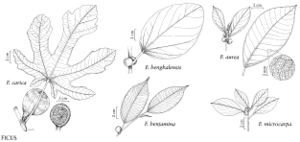Ficus microcarpa
Suppl. Pl., 442. 1782.
Trees, evergreen, to 30 m. Roots aerial, abundant, sometimes developing pillar-roots. Bark gray. Branchlets brown, glabrous. Leaves: stipules 0.7-0.9 cm; petiole 0.5-1 cm. Leaf blade elliptic, obovate to ovate, 3-11 × 1.5-6 cm, thinly leathery, base obtuse to cuneate, margins entire, apex nearly acute to acuminate; surfaces abaxially and adaxially glabrous; basal veins 1(-2) pairs; lateral veins 5-9 pairs, uniformly spaced. Syconia paired, sessile, purple or black, obovoid, pyriform, or nearly globose, 9-11 × 5-6 mm; subtending bracts ovate-lanceolate, 1.5-3.5 mm, apex obtuse to subacute; ostiole closed by 3 flat, apical bracts 2-2.5 mm wide, umbonate.
Phenology: Flowering all year.
Habitat: Disturbed sites
Elevation: 0-20 m
Distribution

Fla., West Indies, native to Eastern Hemisphere.
Discussion
Ficus microcarpa is commonly cultivated in Florida. At press time, word had been received (Michael O'Brien, pers. comm.) that F. microcarpa was recently found in the Los Angeles area, where the pollinating wasp apparently has been present since 1992. Voucher specimens are not yet available.
Selected References
None.
